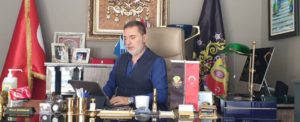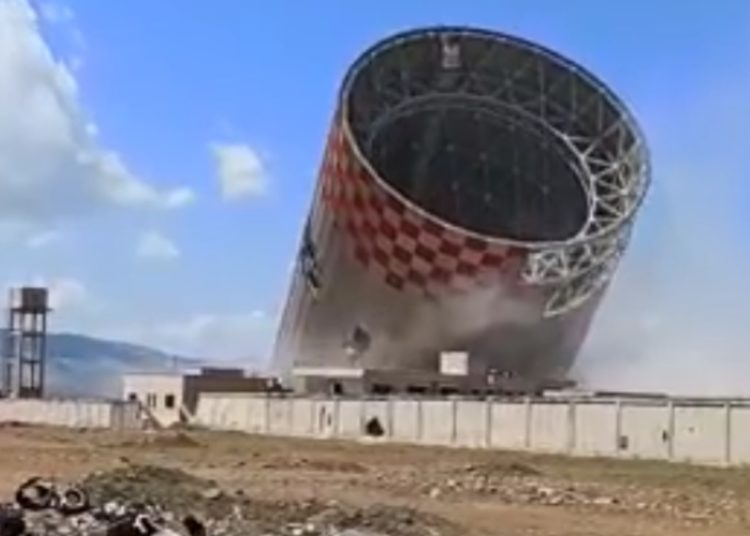Abdullah Bozkurt/Stockholm
Allegations that the government of President Recep Tayyip Erdoğan has been plundering the wealth and assets of Syrians in territories under the control of the Turkish military and its proxies were fleshed out with a person who was recently identified in the Turkish media.
A businessman named Murat Özvardar, whose wife works for Turkish intelligence, was accused of dismantling factories in Aleppo and moving them to Turkey. Özvardar allegedly plundered factories in the industrial zone and relocated them to Turkey through his companies, pocketing profits on the back of the Turkish government’s occupation of north and northwest Syria.
Allegations that the Erdoğan government has been unlawfully exploiting Syrians’ wealth and assets had already been raised at the United Nation’s Security Council in letters submitted by Syrian government representatives in New York. Documents about multiple incidents of factory looting, excavation of antiquities and forced purchase of agricultural goods from local farmers were presented to the Security Council with specifics such as time and place throughout the years.
Syrian ambassador’s letter accused Turkey and others of looting fields in Syria:
“That [Erdoğan government] regime has been and continues to be implicated in the theft and looting of Syria oil, antiquities and factories,” wrote Bashar Ja’afari, Syrian ambassador and permanent representative to the UN, in a letter to the secretary-general and the president of the Security Council on January 2, 2020.
In a May 19, 2020 letter the Syrian ambassador provided details of the looting of the Zayzun thermal plant, valued at $660 million, by al-Qaeda-linked terrorist groups that are funded and armed by Turkey. The main cooling tower at the plant, located in the countryside outside Hama, was destroyed by a terrorist group on May 7, 2020, for the purpose of stripping its metal panels and selling them to Turkish smugglers and traders.
The looting of a power plant and the sale of its parts to Turkey was documented at the UN Security Council by the Syrian government:
The group and many others that were supported by Turkey has engaged in looting generators, transformers, central panels, cables and fuel tanks at the Zayzun plant and selling them as spoils of war to Turkey. That campaign dealt a heavy blow to the already crippled power grid in Syria, which is operating at 50 percent capacity.

“On May 26, 2020, the terrorist organizations affiliated with the regime of Recep Tayyip Erdoğan brought in harvesters to the occupied area of Ra’s al-Ayn in the northern Hasakah countryside and stole farmers’ crops and smuggled them to Turkish territory. Moreover, they seized some of the crops by threatening to burn farmers’ fields unless they did as they were told. Those actions are part and parcel of a policy that is aimed at systematically preventing those crops from being shipped to areas controlled by the Syrian State,” the Syrian ambassador told the UN in a letter dated May 31, 2020.
“It [Turkey] has also stolen machinery and merchandise from Syrian factories and property from Syrian citizens in the areas occupied by its forces or where its proxy terrorist organizations and entities are present,” said Louay Falouh, then-chargé d’affaires at Syria’s permanent mission to the United Nations, in a letter to the UN on December 5, 2019.
“Following its military attack against Syria on 9 October 2019, the Turkish regime and its proxy terrorist organizations have stepped up illegal excavations for antiquities and treasures in the occupied areas,” he said, listing archaeological sites around Tall Tamr, Ayn al-Arab, Manbij and Afrin.

In a January 12, 2021 letter, Falouh claimed that Turkish forces in Syria forced all farmers to sell their wheat and barley to Turkish merchants, who then transferred the crops to Turkey via the Ra’s al-Ayn and Tall Abyad border gates, and stole the people’s stocks of wheat, barley and seed and stored them in the industrial area of Ra’s al-Ayn in preparation for transport to Turkey. He also alleged that Turkish proxies engaged in drug trafficking and sold narcotics to area youngsters.
Turkish businessman Özvardar, who was prosecuted over a cocaine drug bust in 1988, is close to influential figures in the Erdoğan government. He reportedly operates in multiple sectors, from construction and furniture to energy and appliances. His Twitter profile photo pictures him sitting at a desk with the Ottoman state insignia behind him. In April 2020 he posted a picture with Interior Minister Süleyman Soylu, who controls the Turkish army-occupied areas with governors his ministry appoints and runs local security and civil governance.

Özvardar made the headlines in 2017 when he married Hande Fırat, who was earlier identified as a MIT operative by Nordic Monitor, expanding his network in the government. Fırat works as a journalist for CNN Türk, which is a government propaganda media outlet under government control. Fırat’s frequent visits to MIT headquarters were exposed in court records, and her role in a 2016 coup attempt with a staged interview of Erdoğan on FaceTime was revealed to be part of a false flag operation planned by intelligence. While speaking wth Erdoğan on the phone, an incoming call on the screen showed she was called by intel agency head Hakan Fidan’s right-hand man.
The couple denied allegations that they enriched themselves by looting factories in Syria and blamed the allegations on government critics while deflecting the attention from addressing the core allegations.
Syrian government letter to the UN Security Council accusing Turkey of looting antiquities:












